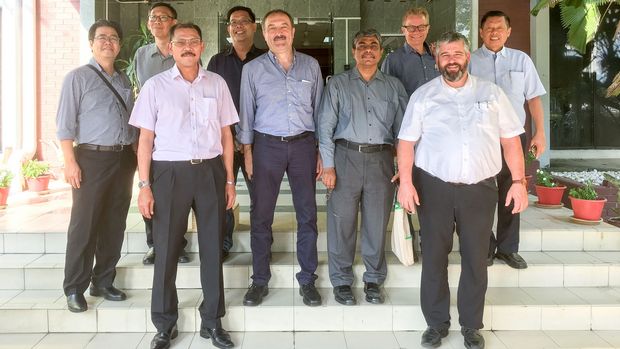Palm oil wood: Attractive business oppor-tunity awaits investors
09/11/2017Significant progress in the production technology and positive economic conditions gave cause for optimism.
Oil palms are predominantly cultivated on giant plantations in Malaysia and Indonesia. The flesh of the fruit contains the palm oil, which is sought-after worldwide. Meanwhile, the wood remains largely unused. Besides the ecological dilemma, the palm oil wood interest group also found this questionable from a commercial perspective. The organization brings together five leading technology providers from the wood sector. Its objective is to achieve process reliability in the production of competitive, intelligent products made from the palm oil wood left over in large quantities after the fruit has been harvested. “Potential that is just waiting to be used,” says Dr. Leible from Weinig AG. The alliance of Weinig, Leuco, Kleiberit and EWD creates an ideal mix of attributes, the largest of which is the members’ know-how of process technology across the entire value chain. “Our strategic alliance combines the precise expertise required to create sustainable industrial production technology,” says Wolfgang Maier, Marketing Director at Leuco. The material requires both experience in the design of complete solutions and specialized knowledge of tools. Drying technology and cutting are also key issues. Practical tests have already been conducted and the first products successfully manufactured. Palm oil wood has proven to be excellently suited to the production of panels and represents an alternative in light-weight construction.
While on their trip to Asia, representatives of the interest group met with great encouragement from the experts on-site. Discussions generated a number of starting points for collaboration. State organizations and oil mill operators are strongly interested in the sustainable utilization of oil palm trunks. The pressure of public opinion is playing an important role in this regard. The destruction of rainforest for more and more plantations and the slash-and-burn clearance of the harvested plants are coming under criticism. The trunks are now increasingly being turned into chippings, which are used to treat the ground. However, the companies involved appear willing to consider to another solution. The objective is to utilize the material on a grand scale in a CO2-neutral fashion. “If a competitive sale price can be achieved in the market for the wood, our model has a good chance with the oil palm companies,” says Dr. Leible, having returned from Asia. The industrial utilization of the palm oil wood could, therefore, have combined financial and ecological benefits. One prerequisite, however, is the creation of a high-volume, transregional sales market that is attractive to potential investors. “We believe large, international companies with high production capacities are primarily suitable,” says Peter W. Mansky of Kleiberit. According to Mr. Mansky, such companies are also in a position to consistently accept the large volumes of palm oil wood offered. The interest group now considers finding and bringing together potential future partners to be a high priority. Dr. Leible: “The processing procedures have now been mastered and the technology partners are in place. Now it is up to ambitious companies in the wood sector to follow the template and enter this new and attractive business segment.”
Photo:
The palm oil wood interest group gained valuable insights at a meeting with the University Putra Malaysia (UPM), left to right: Sunny Wee – Weinig Asia; Dr. Martin Dressler – Leuco; Thomas Kühnelt – Weinig Concept; Dr. Ratnasingarn – UPM; Dr. Ing. Otto Leible – Weinig Concept; Goh Kun Wha – Leuco Malaysia; Patrick Phua – Weinig Asia; Dr. Loh – UPM; KC Nyew-Periforce




